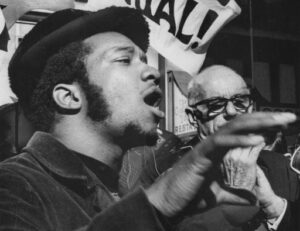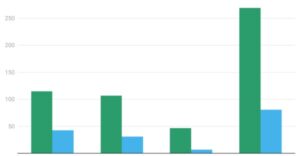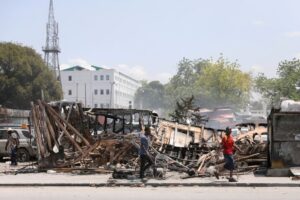This short set of theses about the October 2 presidential election in Brazil, by Valerio Arcary, a socialist activist with the Resistance current in the Party of Socialism and Freedom (PSOL) appeared first in Esquerda Online, and subsequently in Correspondencia de Prensa. ISP translated it to English.
The theses propose tasks for the Brazilian left in the likely event that Bolsonaro won’t accept defeat, and at time when the constitutionally designated election authorities have allowed the military to conduct its own audit of the vote.
- At this stage of the electoral campaign Lula’s lead in the polls is so great that’s possible that he will win an outright victory in the first round of the October 2 presidential election. Bolsonaro’s unfavorability rate remains very high, more than 50 percent. A Lula victory in the Southeast and Northeast, supported by the poorest, women, Afro-Braziliansand young people, and winning over supporters of other candidates, especially from Ciro Gomes [a veteran center-left politician], could give Lula the 2 percent of the electorate he needs to get the majority.This would be the best opportunity, because if a second round between Lula and Bolsonaro becomes necessary, October 2022 will undoubtedly be the longest month of our lives. Bolsonaro will not hesitate to “play terror” (toy with violence), starting on election night, October 2. “Playing terror” is one way to describe what will be a terrifying, relentless and ruthless election campaign. We have already had a good taste in recent months of how fascist-kindled social hatreds spread political terror. But it could be much worse.
- We must take seriously Bolsonaro’s systematic campaign to undermine confidence in electronic voting and to denounce “fraud” before any votes are cast. Bolsonaro has already made clear that he will not accept the results if he doesn’t win. He plans to unleash his political base with charges that the election was stolen from him.It would be a mistake to assume that this campaign won’t have a tremendous resonance among the tens of millions who identify with Bolsonaro’s politics (Bolsonarismo). They have shown themselves to have shock troops. Underestimating Bolsonaro’s charismatic authority and the appeal of a strongman to the reactionary masses who follow him would be unforgivable. September 7 provided a fundamental lesson: there is a fascist-type political movement in Brazil. Any misunderstanding, hesitation or prevarication about the nature, extent and depth of this political force would be an error with strategic consequences. It may not represent a “classic” fascist party, for many and complicated reasons, but that doesn’t diminish the danger that Bolsonarismo represents.
One could look at structural factors, like splits among the capitalist class and the difficulty of organizing the middle classes, and superstructural factors. Bolsonaro’s campaign in 2018 was heavily improvised, borrowing a small party’s ballot line, cutting dealsand handing out government posts to the more than dozen parties of the corrupt “center” in the Congress. Bolsonaro’s leadership style is personalistic and divisive, even to the far right, among others. But Bolsonarismo will not dissolve following an electoral defeat. Only an overwhelming political defeat, giving way to the prosecution and jailing of Bolsonaro—which only could happen with a change in the balance of forces—will open that path.
- The plan for the armed forces to conduct a vote tally in parallel with the TSE (Superior Electoral Court) is an anti-democratic anomaly that has not been denounced. It was not a “smart maneuver” to drive a wedge between Bolsonaro and the army. Under explicit public blackmail, it was an irrational concession, disguised as consent, so that an undue and arbitrary external control could question the electoral result. To imagine that the armed forces demanded this prerogative as a way of reinforcing the legitimacy of the TSE if Lula wins is a foolish gamble that ignores the army’s role over the four years of Bolsonaro’s term. The Electoral Justice [the TSE plus regional and local judges, established by the Brazilian constitution] is the only institution granted the authority to count votes, certify them and to release the results. The right to supervise elections does not authorize independent counting, much less the announcement or proclamation of any results. None. The permission granted to the armed forces to establish their own tallying center was misplaced. Unlike in the U.S. elections—where the Joint Chiefs of Staff theoretically stays out of elections and didn’t help Trump on January 6—in Brazil, the Army High Command is Bolsonaro’s accomplice.
- If Bolsonaro does not recognize the electoral result, as is foreseeable, it will be necessary to fight to open, immediately, an impeachment of the president. Bolsonaro inside the Planalto Palace (seat of the Executive Power in Brasilia) will be an outlaw. This initiative must come from both the legislative and judicial branches. The Superior Electoral Court must take the initiative to defend the integrity of the electoral process that it itself organized. The National Congress cannot continue to be held hostage by a president who subverts the democratic regime despite his electoral defeat.
- In these circumstances, mass mobilization will be indispensable. Ultimately, it will be the decisive factor. On the night of Sunday, October 2, it will be essential to take to the streets to celebrate the defeat of the fascist and to defend Lula’s victory. The role of the left in this terrible but foreseeable scenario will be vital. If only a victory in the first round, and a transition without terrible turbulence, were possible. But it is not. We need a plan A, a plan B and even, to be sure, a plan C. Let’s prepare for the worst case scenario. We cannot let victory at the ballot box slip away. Many people have suffered too much to make it possible.




